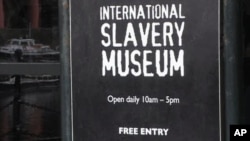Britain and many other countries have been marking UNESCO Slavery Remembrance Day. It commemorates the 1791 uprising of enslaved Africans on the island of Saint Domingue, or modern day Haiti. The British government says it's at the forefront of efforts to tackle the legacy of the slavery, but campaigners say much more needs to be done.
Liverpool owes much of its past wealth to slaves. From the 16th to the 19th centuries, ships lined the city's docks waiting to be loaded with goods from across Europe to be sold in Africa in return for slaves. It was the first leg of the brutal trade that enslaved an estimated 11 million Africans.
Nowadays on the same docks is the International Slavery Museum. As the world marks Slavery Remembrance Day, curators here say this dark era of the city's history must be remembered.
"Liverpool was the first city to apologize formally for its role in the transatlantic slave trade," said Claire Benjamin of the International Slavery Museum. "The wealth of the city was built on that. The docks, the port, the river. The city... it was built on the legacies, on the business of the transatlantic slave trade."
Stark reconstructions confront visitors to the museum. Ships packed in the slaves so tightly that an estimated 15 percent died from disease or starvation on the crossing from Africa to the Americas.
Maps show how the wealth of Europe and its colonies depended on the triangular trade from Europe to Africa, the transfer of slaves across the Atlantic to the new world, and the return to Europe of raw materials like sugar and cotton cultivated by slaves in the Americas.
This replica of the slave ship Zong sailed into London three years ago on the 200th anniversary of the abolition of slavery. It gives a sense of the horrific conditions on board.
Britain has yet to formally apologize for its role in the slave trade. Fernne Brennan is an expert on the legacy of the slave trade at the University of Essex. She says an apology is only a first step.
"When we look at retention in schools, when we look at access to public services and so on, there is still a distinct disproportionate problem for black people in the diaspora, i.e. in the West, as well as obviously in Africa and the Caribbean," said Brennan.
Some people want financial compensation for countries and individuals affected by the slave trade. But Minister for Communities Andrew Stunell says restitution isn't the right approach.
"We just don't think that that's an appropriate way forward for events of 200 years ago," said Stunell. "What we have to do now is to make sure that those who were the victims of slavery, their descendants and of course migrants of many sorts, not all of whom were in any way victims of slavery, are treated with respect and given the opportunities they need to flourish."
Reminders of the city's role in the slave trade are all across Liverpool. Jamaica Street, named after the destination of many slave ships. Lime Street railway station, used to transport cotton and other goods worked by slaves in America.
The city itself has moved on. But more than 200 years after the abolition of the slave trade, activists say the scars have yet to fully heal both here and in communities around the world.




